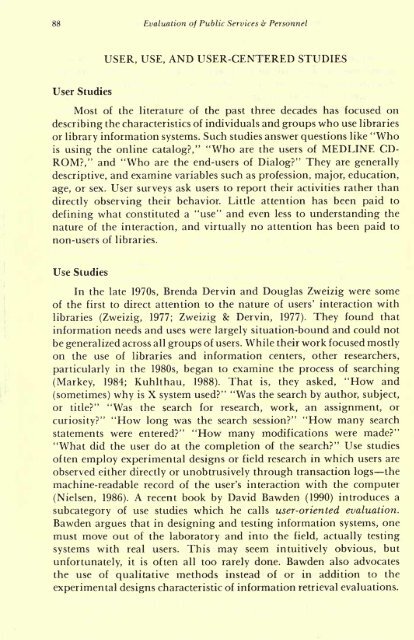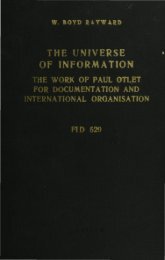User-Centered Evaluation of Information Retrieval - ideals
User-Centered Evaluation of Information Retrieval - ideals
User-Centered Evaluation of Information Retrieval - ideals
You also want an ePaper? Increase the reach of your titles
YUMPU automatically turns print PDFs into web optimized ePapers that Google loves.
88 <strong>Evaluation</strong> <strong>of</strong> Public Services b Personnel<br />
USER, USE, AND USER-CENTERED STUDIES<br />
<strong>User</strong> Studies<br />
Most <strong>of</strong> the literature <strong>of</strong> the past three decades has focused on<br />
describing the characteristics <strong>of</strong> individuals and groups who use libraries<br />
or library information systems. Such studies answer questions like "Who<br />
is using the online catalog?," "Who are the users <strong>of</strong> MEDLINE CD-<br />
ROM?," and "Who are the end-users <strong>of</strong> Dialog?" They are generally<br />
descriptive, and examine variables such as pr<strong>of</strong>ession, major, education,<br />
age, or sex. <strong>User</strong> surveys ask users to report their activities rather than<br />
directly observing their behavior. Little attention has been paid to<br />
defining what constituted a "use" and even less to understanding the<br />
nature <strong>of</strong> the interaction, and virtually no attention has been paid to<br />
non-users <strong>of</strong> libraries.<br />
Use Studies<br />
In the late 1970s, Brenda Dervin and Douglas Zweizig were some<br />
<strong>of</strong> the first to direct attention to the nature <strong>of</strong> users' interaction with<br />
libraries (Zweizig, 1977; Zweizig & Dervin, 1977). They found that<br />
information needs and uses were largely situation-bound and could not<br />
be generalized across all groups <strong>of</strong> users. While their work focused mostly<br />
on the use <strong>of</strong> libraries and information centers, other researchers,<br />
particularly in the 1980s, began to examine the process <strong>of</strong> searching<br />
(Markey, 1984; Kuhlthau, 1988). That is, they asked, "How and<br />
(sometimes) why is X system used?" "Was the search by author, subject,<br />
or title?" "Was the search for research, work, an assignment, or<br />
curiosity?" "How long was the search session?" "How many search<br />
statements were entered?" "How many modifications were made?"<br />
"What did the user do at the completion <strong>of</strong> the search?" Use studies<br />
<strong>of</strong>ten employ experimental designs or field research in which users are<br />
observed either directly or unobtrusively through transaction logs the<br />
machine-readable record <strong>of</strong> the user's interaction with the computer<br />
(Nielsen, 1986). A recent book by David Bawden (1990) introduces a<br />
subcategory <strong>of</strong> use studies which he calls user-oriented evaluation.<br />
Bawden argues that in designing and testing information systems, one<br />
must move out <strong>of</strong> the laboratory and into the field, actually testing<br />
systems with real users. This may seem intuitively obvious, but<br />
unfortunately, it is <strong>of</strong>ten all too rarely done. Bawden also advocates<br />
the use <strong>of</strong> qualitative methods instead <strong>of</strong> or in addition to the<br />
experimental designs characteristic <strong>of</strong> information retrieval evaluations.
















